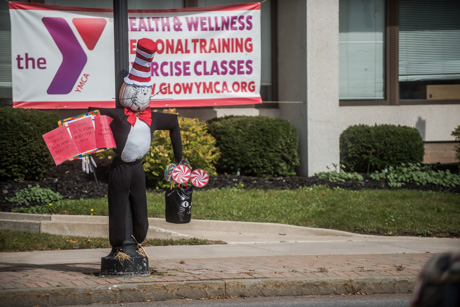Photo: Klaus Kremmin, founder of the Pavilion Gift Company, poses outside the front door of the company’s modern facility, now in Bergen.
BERGEN – Klaus Kremmin knows the meaning of hard work, and at 74, he shows up for work nearly every day.
Kremmin owned an injection-molding company, which he started in Pavilion, and which evolved into the Pavilion Gift Company, now located in Bergen and where he has an office.
Risking All for a Better Life
Kremmin’s story about his family begins in the early 1930s in Nazi Germany. His father worked for the gestapo -- a secret-police organization employing underhanded and terrorist methods against persons suspected of disloyalty.
As years went by, Kremmin’s father didn’t like the direction the gestapo was taking – putting up barbed wire and land mines. He was becoming dissatisfied with their actions, and they were suspicious of him.
“They were monitoring my father, and if they thought he didn’t agree with them, he would be sent to Moscow or Siberia for 20 years,” Kremmin said.
So his father made the decision to escape.
Kremmin was 7 the day his parents, Rudi and Frieda, each took two of the children and boarded separate trains for a day trip.
“My father told the Border Patrol we were going for the day,” he said. “They asked where the rest of the family was, and my father said my mother was home with the other two kids, waiting for our return. My mother told them the same thing, that my father was home with the other two kids.”
The family reunited at a predetermined location in West Berlin. They escaped with only the three layers of clothing they were wearing.
The family lived in a refugee camp for two years, waiting for someone in the United States to sponsor them. During that time, his father worked on the wharf in Bremen. In 1957, a church in Barre, Mass., agreed to sponsor them, and they arrived in the United States with $600 to their name.
Kremmin’s father had served in World War II and was captured in Tunisia while serving under Germany's General Johannes Erwin Eugen Rommel. He was held prisoner of war in Kentucky.
“He loved the United States very much,” Kremmin said.
His father, who is now 97, wanted to move to Rochester, because he had learned a friend who had also escaped from Germany and was living there. So the family moved to Rochester, where he got a job in a day on Brooks Avenue.
Kremmin met and married his wife, Anna, who is Ukranian and with whom he has been married 52 years. They have a son and daughter.
Anna’s family were migrant workers in Germany, and they escaped and went to Brazil, later moving to Rochester.
Kremmin joined the military service here and was stationed in Frankfort, Germany. His daughter, Zina, was born there. His son, Klaus II, was also born in Germany. He got out of the service in 1971 and got a job working for Kodak research. He had gone to college on the G.I. Bill.
Then he took a job with a plastic company near the airport in Rochester.
“The company grew and grew, but the owners were gone all the time,” Kremmin said. “So I decided if I was going to run a company, it might better be my own.”
An Entrepreneurial Family
His first business, injection molding, was started in his father’s garage on Dean Road, off Ridge Road in Rochester.
“There were times when I only had the change in my pocket and I wondered how I was going to feed my kids,” Kremmin said.
His business grew, and he outgrew the garage.
“In the early 1980s, I bought a building in Pavilion, which used to be DeWitt’s heliport,” Kremmin said. “My brother was working with me, and at one time, we had 20 employees.”
His company, Syntec, was very successful. He said they always tried to hire local people. Their customers included Kodak and medical companies, making very precise parts for blood analyzers and gyroscopes.
Klaus II had graduated from MIT and Zina graduated from Syracuse University with a degree in Business Management.
He wondered what Zina was going to do and how he could help her.
Zina had designed a line of collectible figurines called “Zingleberries,” which she promoted at trade shows around the country. It was there she met her husband, Rich Hocker.
Kremmin and his brother hit on an idea to make a stand on which Zina could display her figurines. Thus, was born the revolving display stand. The stand can be activated by AC batteries or solar power.
Zina started her business in 1998 in Le Roy, where she rented space for two years. She was selling her merchandise and the display stands at trade shows and business was so good, in 2000, Kremmin sold the business in Pavilion.
They built the new modern facility in Bergen, which he and his brother designed. They added on to the building in 2007.
Today, the Pavilion Gift Company sells wholesale gift items all over the world and the Hockers run the business.
Klaus II started an injection-molding company making plastic gears, and his company is now located in part of Pavilion Gift Company.
Kremmin admits to having often worked 24 hours a day, seven days a week.
“I love to work, and I love this country,” Kremmin said. “And I count my blessings every day for the opportunities I’ve had here.”
Kremmin officially “retired” in 2000, but comes in to work almost every day. He looks after the building, fixes the faucets and the electrical if something is wrong.
Cheerfulness in Tough Times
“I cheer everybody up if I can,” he said. “I also have a hobby shop here.”
He said the first months of the coronavirus pandemic shutdown were terrible. Orders were canceled and help was laid off.
“So Zina decided to make masks,” Kremmin said. “Things are starting to pick up.”
With his work ethic, he is disgusted, however, with the employees who refused to come back to work because they were getting government money. Many of them still haven’t come back, he said.
Photos by Virginia Kropf.
Below, this case shows some of the rotary displays invented by Klaus Kremmin, of Bergen.
Below: Klaus Kremmin invented the rotary display shown here. His invention evolved into the Pavilion Gift Company, now located in Bergen where he still has an office.












